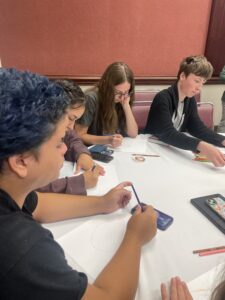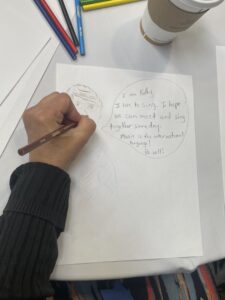
Photo by Greta Lapp Klassen.
On Friday morning, Sue Park-Hur opened up the seminar “Drawing Hope for the Korean Peninsula” by asking “Why do people move?”
Some of the answers the 38 participants came up with were limited resources, escaping persecution, war, climate change and seeking educational opportunities.
Park-Hur talked about her Korean family’s own migration story to the United States over 40 years ago. Twenty-three of members of her extended family flew to the U.S. at the invitation of an aunt who was married to a member of the U.S.United States military. The military connection helped them get visas, which were becoming more readily available to Koreans in the 1970s.
“A lot of [Koreans] who are here often say ‘We came because you guys first came to us.’” Park-Hur said, explaining that the Korean diaspora in the U.S.is largely due to the Korean War.
But the Korean War never really ended, Park-Hur said. “We have a ceasefire that was signed in the ’50s, but it doesn’t mean the war has ended. It’s a pause. We’ve had this pause in Korea for 75 years.”
She spoke about the pain that this separation has caused. Because of an arbitrary line, families have been split apart, unable to see or communicate with each other for 75 years. One of the biggest issues with the separation between the two Koreas is that it becomes harder to reconcile differences the longer they are kept apart.
“The more we are divided, the more indifferent we become,” Park-Hur said. “It’s easy to dehumanize people when there are less encounters.”
Combating dehumanization and building a sense of common humanity is the goal of Okedongmu Children in Korea, a non-profit named after the Korean word for that means putting arms around each other in friendship. One of their initiatives is sending postcards between South Korean and North Korean children. The postcards are hand-drawn self-portraits and messages of peace and friendship, and have been such a successful endeavor that an art exhibit known as Drawing Hope was created to display them and spread awareness about unresolved conflict. The exhibit has been shown in Los Angeles and Belfast, Northern Ireland, and will hopefully be shown at the United Nations in November.
After learning about the situation in Korea and the work of Okedongmu, participants were invited to draw their own self-portraits and write messages of peace, love, and reunification.

Photo by Greta Lapp Klassen.
Participants wrote things like “I hope we can meet and sing together someday,” and “I love to eat tasty meals with rice – I am an old man.” The group also collaborated on a life-sized drawing of a girl dancing.
Noah from Goshen, Indiana, said he found it really sad to learn that many people in the Korean peninsula can’t see their family members. “I wouldn’t be able to imagine not seeing my mom for that long,” he said, referring to a story shared about a mother and son who were torn apart for decades, only able to reunite for three days during a “family reunion.”
Park-Hur said that she hopes attendees of the seminar remember to remain curious about the causes of migration and be advocates for a unified world.
“When you meet somebody in your community who might have a different history,” she said,
“lean into that. A lot of people who have been traumatized by war feel really isolated. Koreans want to talk about these things. Continue to spread the message of peace wherever you go.”
Written by Greta Lapp Klassen for MC USA.

